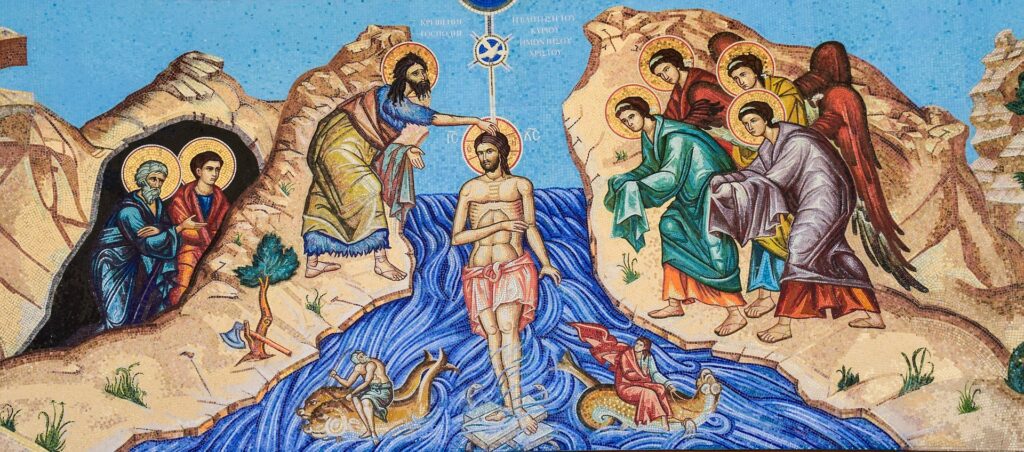This page may contain affiliate links, which means I may receive a commission from purchases made through links.
As we study the sayings and teachings of Jesus, we are able to understand more about what he was thinking as he taught, but we also get to know the gospel writers as well. Like any writer, they all (Matthew, Mark, Luke, and John) told their stories with a unique purpose and personal flare. John says the most about Jesus’ earliest days of ministry, so we have spent a lot of time in his account so far. However, in an effort to stay as chronological as possible (a difficult task), we are bouncing around between authors. Our goal is to get a fuller picture of the gospel and of the way Jesus thought and taught. Today we direct much of our attention into the Old Testament and the way that Jesus fulfilled certain messianic prophecy.
Church tradition recognizes Mark’s account of the gospel as an account of events given by Peter the Apostle, but written by the hand of John Mark. Mark was at one time the missionary companion of Paul and Barnabas (Acts 13:5) and later a scribe for Peter. It is also likely the earliest gospel account. These factors make good sense of the fact that it is the shortest and fastest-paced of the four books. In an effort to get words on paper to preserve the traditions of Christ before his passing, Peter likely would have given Mark the highlight reel of his experience and understanding of Christ’s works.
Jesus Preaches the Gospel
When Luke tells us about Jesus’ first sermon in Nazareth, he gives us details about the conversation between Jesus and his townsfolk, the specific Scripture Jesus taught from, his foretelling of their rejection of him, and more. But Mark introduces the Great Galilean Ministry in much simpler terms. He says, “Now after John was arrested, Jesus came into Galilee, proclaiming the gospel of God, and saying, ‘The time is fulfilled, and the kingdom of God is at hand; repent and believe in the gospel'” (Mark 1:14-15). Then it moves immediately from his preaching to his calling of disciples.
With Luke’s heavy emphasis on the work of the Holy Spirit in Christ’s ministry, he lays the groundwork for his sequel, Acts, which looks at the work of the Spirit in the Church. But Mark wants to quickly move us from point A to point B. No sequels. No fluff. Just the gospel in a nutshell. And what is the summary of this gospel that Jesus preached? “The time is fulfilled, and the kingdom of God is at hand.”
Jesus clearly had more words than these. Included in this brief statement is all of Jesus’ initial travels and preaching in Galilee, including what we discussed previously of his preaching in Nazareth.1 His message there was that the Scripture prophesied of the coming Messiah (anointed one) who would deliver his people from oppression was fulfilled in him. Later, his parables will focus heavily on the way that the kingdom of God works in the world and in the world to come. And his coming crucifixion will be the point in this story when he is crowned King of this kingdom.
The Kingdom is the Gospel
The entire gospel narrative, no matter the author, revolves around this reality: The long-awaited kingdom of God is here, and Jesus is its King. This is the only government worthy of absolute loyalty. This is the message Jesus commands people to repent toward and believe in. It is the very same gospel that Paul says is the power of God to save both Jews and Gentiles alike (Romans 1:16).
Mark’s account of the gospel puts the pedal to the metal to get us to the death and resurrection of Christ. Matthew, on the other hand, takes his time. He places a great deal of emphasis on Jesus’ fulfillment of messianic prophecy in the process. He uses the word “fulfill” 17 times, as opposed to Mark’s 3 uses. And he connects 15 of them directly to prophecy. One of these occurs in Matthew’s parallel introduction to the ministry of Jesus in Galilee:
“Now when he had heard that John had been arrested, he withdrew into Galilee. And leaving Nazareth he went and lived in Capernaum by the sea, in the territory of Zebulun and Naphtali, so that what was spoken by the prophet Isaiah might be fulfilled: ‘The land of Zebulun and the land of Naphtali, the way of the sea, beyond the Jordan, Galilee of the Gentiles— the people dwelling in darkness have seen a great light, and for those dwelling in the region and shadow of death, on them a light has dawned.’ From that time Jesus began to preach, saying, ‘Repent, for the kingdom of heaven is at hand'” (Matthew 4:12-17).
Matthew’s account also includes a brief summary of Jesus’ gospel of the kingdom, but why did he feel the need to quote this prophecy when the other gospel writers didn’t?
Is Isaiah’s Prophecy Messianic?
The prophecy that Matthew quotes is Isaiah 9:1-2. As you may recognize by now, I don’t like to take things at face value. So to understand the immediate context of this prophecy, we are going to dig into Isaiah a little bit.
I suggest you stop here and read Isaiah 7-9. Doing so will help you to understand the train of thought in the remainder of this post.
Context of Isaiah
Isaiah lived in the Southern Kingdom of Judah, but he directs many of his prophecies at the Northern Kingdom, Israel. In chapter 7, the king of Judah, Ahaz, becomes afraid of Israel and Syria, who came together to attack Judah. God promises Ahaz a sign that they will not take Judah. It is a sign that Israel and Syria will not come out on top. Yahweh says that “the virgin (Hebrew almah, meaning young woman or maiden) shall conceive and bear a son, and shall call his name Immanuel” (Isaiah 7:14, parentheses added). The gospel writer quoted this very same prophecy in Matthew 1:22-23 as being a messianic one. According to him, Mary’s miraculous virgin conception of Christ by the Holy Spirit was a fulfillment of this prophecy.
While I agree with Matthew’s assessment, if we do not get how uses prophecy, it creates logical problems. When we look at the original context, things get confusing. As I mentioned above, the Hebrew word almah in Isaiah 7:14 refers to a young woman or maiden. She may or may not have some sort of sexual history. It does not preclude virginity, but it also does not require it for a woman to fit into this category.
Additionally, Isaiah’s prophecy specifically indicates that this is a sign for King Ahaz. When Isaiah spoke this prophecy, Ahaz would have expected a fulfillment during his lifetime, not 700+ years later. This means that a virgin birth of a Messiah figure was not in view as Isaiah spoke to the king. Rather, a child to be born in his day and named Immanuel would become this sign from God.
Who is Immanuel?
There is debate as to the identity of this Immanuel figure. One view is that Immanuel and his mother are unidentifiable. They would have been individuals that only the original audience would have known. This is certainly possible, but there are other views as well.
Another option is to connect this Immanuel prophecy with the Isaiah’s children. In 7:16, we read of the Immanuel child, “Before the boy knows how to refuse the evil and choose the good, the land whose two kings you dread will be deserted.” In 8:3-4, Isaiah named his son Maher-shalal-hash-baz at the command of Yahweh. “For before the boy knows how to cry ‘My father’ or ‘My mother,’ the wealth of Damascus and the spoil of Samaria will be carried away.” Isaiah directly prophesies to Immanuel in the same chapter (8:8), indicating that the child is already born. This would make it quite possible that Immanuel and Maher-shalal-hash-baz are the same.
I lean toward that connection myself. However, a common consensus among modern Jews and Christians is that Immanuel refers to king Hezekiah. Hezekiah was the son of Ahaz, the original recipient of the prophecy. There are many reasons for this consensus, including Isaiah 9:6-7. It predicts a child upon whom the government will rest and who will sit on the throne of David. They connect chapters 7 and 9 as referring to the same child, distinguished from the son in 8:3.
Chapter 9 could also refer to Josiah, a later king of Judah. He was also righteous (2 Kings 22:1-2), but based on the verb (“a child is born,” rather than “a child will be born”), it seems to be speaking of a person already living. That would basically demand that this particular child be Hezekiah.
Matthew’s Use of the Old Testament
Regardless of Immanuel’s original identity, we know that the children mentioned in Isaiah 7-9 are signs to their contemporaries.
As stated previously, this creates a logical problem for us. If Isaiah was speaking of a child in his own day, how can Matthew appropriate this as though it is about Jesus? Many Jews and skeptics take the context of Isaiah to mean that the early Christians were either stupid or just making stuff up to force Jesus into the text. These critics believe that Isaiah cannot be referring to Jesus since the prophecy has a contemporary fulfillment.
Ignorance of Matthew’s purpose causes much of this skepticism. In my post on the baptism of Jesus, we discussed a concept called recapitulation. What often happens in the various gospel accounts, and particularly frequently in Matthew’s, is that the authors observe and point out patterns in Scripture Christ reenacts.
There are certain passages which have a very obvious sense that they are Messianic prophecy, like Isaiah 11. It predicts a coming “shoot from the stump of Jesse,” upon whom God’s Spirit will rest. This shoot will enact righteousness, bring about universal peace, and regather his scattered people from among all the nations. We know that this chapter has seen partial fulfillment in Jesus Christ, but there are aspects still to come.
At the same time, there are also many typological stories that Christ reenacts. He reveals himself hidden in the Scriptures all along. When we understand this, the virgin birth becomes not the object of a prediction, but a miraculous sign for us to look back on as a reminder that God has woven a mysterious tapestry of history. God brought about our deliverance, just as he promised Ahaz that original sign of his own people’s deliverance.
Messianic Prophecy in Matthew
We see a similar connection in our primary text. Let’s read it again. It says, “Now when he had heard that John had been arrested, he withdrew into Galilee. And leaving Nazareth he went and lived in Capernaum by the sea, in the territory of Zebulun and Naphtali, so that what was spoken by the prophet Isaiah might be fulfilled: ‘The land of Zebulun and the land of Naphtali, the way of the sea, beyond the Jordan, Galilee of the Gentiles— the people dwelling in darkness have seen a great light, and for those dwelling in the region and shadow of death, on them a light has dawned.’ From that time Jesus began to preach, saying, ‘Repent, for the kingdom of heaven is at hand'” (Matthew 4:12-17).
This portion of Isaiah 9 flows right out of chapter 8. In fact, the oldest numbering systems put 9:1 as the last verse of chapter 8. With that in mind, look at the complete thought from Isaiah 8:21-9:2:
“They will pass through the land, greatly distressed and hungry. And when they are hungry, they will be enraged and will speak contemptuously against their king and their God, and turn their faces upward. And they will look to the earth, but behold, distress and darkness, the gloom of anguish. And they will be thrust into thick darkness. But there will be no gloom for her who was in anguish. In the former time he brought into contempt the land of Zebulun and the land of Naphtali, but in the latter time he has made glorious the way of the sea, the land beyond the Jordan, Galilee of the nations. The people who walked in darkness have seen a great light; those who dwelt in a land of deep darkness, on them has light shone.”
“A Son is Given”
This passage of Isaiah connects to the child given verses later in 9:6-7, probably King Hezekiah. Yet, despite all the good he did, Hezekiah didn’t quite fill David’s shoes. And even David himself didn’t meet the standard of God’s ideal King. Because of prophecies like this, there was still a Jewish expectation of a perpetual and permanent reign on David’s throne by a Messiah who would become an even greater fulfillment of these words.2
Messianic prophecy, especially in the book of Matthew, is not necessarily a one-to-one prediction of events. Rather, it is often fulfilled (literally completed) by a retelling of the same events in the life of Jesus. To a degree, the original audience of Isaiah had indeed “seen a great light” (Isaiah 9:2), but Matthew is telegraphing to us the truth that Jesus is a greater reenactment of this story. God blesses this particular region of northern Galilee again by “a great light.”
The gospel writer seems to be pointing his readers to the fulfillment of a promise given a few verses later. It says that one will sit “on the throne of David and over his kingdom, to establish it and to uphold it with justice and with righteousness from this time forth and forevermore” (Isaiah 9:7). This background contributes further to the kingdom narrative as Matthew summarizes Christ’s message similarly to Mark. He says, “From that time Jesus began to preach, saying, ‘Repent, for the kingdom of heaven is at hand'” (Matthew 4:17). Further, Matthew’s use of “kingdom of heaven” instead of “kingdom of God” serves to remind the reader that Christ has come, not to establish an earthly nation, but to rule over all things from a higher plane, as the King of all of heaven and earth.
What Shall We Do?
This post has been more theologically dense than others, but that doesn’t mean we can’t get something practical from it. After Peter presented more fulfilled prophecies preached the gospel of King Jesus to his audience in Acts 2, they asked the apostles, “Brothers, what shall we do?” (Acts 2:37). After a heavy retelling of Jesus’ story, they knew they had to do something, but they didn’t know what.
Peter’s command to them begins at the same place where Jesus did: “Repent” (Acts 2:38; Matthew 4:17; Mark 1:15). And I believe God’s message to us today is no different. If you are reading this and you have not been serving King Jesus, repent today and turn to him. Confess your sins. Ask for mercy, and it you will receive it. Find a community of others who have resigned themselves to obey and serve him together. Get baptized. Study the Scriptures. Leave behind your own ways, and find someone who can guide you in the ways of God.
To those who have already put their faith in Christ, may you never stop repenting. The Apostle Paul says that having believed this gospel, God “has delivered us from the domain of darkness and transferred us into the kingdom of his beloved Son” (Colossians 1:13). That means that we are no longer living under the power of sin which enslaved us, nor under the authority of the dark, malevolent spiritual beings who deceive the nations. The assumption when we call him Lord and King is that, though imperfectly, we are striving to follow his teachings.
Repentance is both a one-time response that initiates us into the kingdom of God and an ongoing disposition of learning to obey this gospel. “Repent, for the kingdom of heaven is at hand.”
Footnotes
*If you enjoyed this post, please comment your thoughts down below and consider subscribing to receive updates on new blog posts.
- See my post, Hometown Zero: The Anointed One is Rejected at Nazareth ↩︎
- For a deeper discussion of the Messianic expectations of post-exilic and Second-Temple Jews, listen to Dr. Michael Heiser’s Naked Bible Podcast Naked Bible Podcast Episode 415: Paul’s Use of the Old Testament Series: The Messianic Story Part 3 with Dr. Matt Halsted. ↩︎



